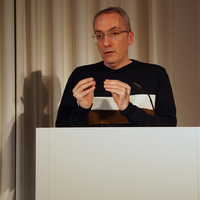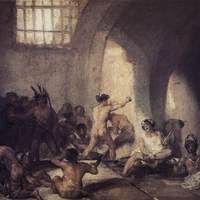Papers by Charles Altieri

Publications of the Modern Language Association of America, Oct 1, 1972
Northrop Frye's recent criticism confronts the contemporary problem raised most powerfull... more Northrop Frye's recent criticism confronts the contemporary problem raised most powerfully by the Vietnam War—can we find a telos or definition of man on which we can ground our moral reactions and our visions of human development. Frye establishes this telos by an analysis of origins. Contained in a civilization's statements of “concern,” in its imaginative treatments of its own condition, one can find an underlying structure of desire which defines the ends of man. This structure and the recurrent images it produces then can serve as the middle terms people use to justify and value their actions. Frye shares his treatment of mediation with contemporary Hegelians like Sartre, Lukács, and Ricoeur, but grounds his absolute in tradition rather than in ideal absolutes or posited evolutionary patterns. Frye's idea of mediation also provides an ethical model for literary criticism: the critic tries to combine literature as product and as cultural possession by interpreting his materials as projections of imaginative desire. Furthermore, we can use Frye to criticize the relativist denial of origins in structuralist critics like Michel Foucault and Jacques Derrida.
Wallace Stevens Journal, 2019
The transcript was heavily edited for readability and circulated among participants for fine-tuni... more The transcript was heavily edited for readability and circulated among participants for fine-tuning; it thus reproduces the dynamic of exchange without in any way striving to be literal. Readers who come upon this material outside the special issue to which it belongs are advised to read the editorial introduction for an account of the rationale behind the following discussion. Voluble epi-tones, but Hard to Hear MB: Good morning and welcome to day two of our seminars. Rachel will start by reading "Two Tales of Liadoff" and offering her preliminary comments. For "Analysis of a Theme," we will reverse the order of the commentary.
Wallace Stevens Journal, 2019
The transcript was heavily edited for readability and circulated among participants for fine-tuni... more The transcript was heavily edited for readability and circulated among participants for fine-tuning; it thus reproduces the dynamic of exchange without in any way striving to be literal. Readers who come upon this material outside the special issue to which it belongs are advised to read the editorial introduction for an account of the rationale behind the following discussion.
Wallace Stevens Journal, 2019
The transcript was heavily edited for readability and circulated among participants for fine-tuni... more The transcript was heavily edited for readability and circulated among participants for fine-tuning; it thus reproduces the dynamic of exchange without in any way striving to be literal. Readers who come upon this material outside the special issue to which it belongs are advised to read the editorial introduction for an account of the rationale behind the following discussion. Exhaling Postromantic hEalth GM: We'll start this session with "Parochial Theme," the first poem in Parts of a World. I'll read it out first, then Gül will make some introductory comments and I will follow through: Long-tailed ponies go nosing the pine-lands, Ponies of Parisians shooting on the hill. The wind blows. In the wind, the voices Have shapes that are not yet fully themselves,
Wallace Stevens Journal, 2019
The transcript was heavily edited for readability and circulated among participants for fine-tuni... more The transcript was heavily edited for readability and circulated among participants for fine-tuning; it thus reproduces the dynamic of exchange without in any way striving to be literal. Readers who come upon this material outside the special issue to which it belongs are advised to read the editorial introduction for an account of the rationale behind the following discussion. Saturated SibilantS and PSeudo-logic LG: Let me start our second seminar by reading out "Lions in Sweden": No more phrases, Swenson: I was once A hunter of those sovereigns of the soul And savings banks, Fides, the sculptor's prize, All eyes and size, and galled Justitia, Trained to poise the tables of the law,
American Literature, 1994
An academic directory and search engine.
Philosophy and Literature, 1992
Liverpool University Press eBooks, Jul 15, 2023
Modern Language Quarterly, 1972
Introductions to Literature This series sets out to provide concise and stimulating introductions... more Introductions to Literature This series sets out to provide concise and stimulating introductions to literary subjects. It offers books on major authors (from John Milton to James Joyce), as well as key periods and movements (from Old English literature to the contemporary). Coverage is also afforded to such specific topics as "Arthurian Romance." All are written by outstanding scholars as texts to inspire newcomers and others: non-specialists wishing to revisit a topic, or general readers. The prospective overall aim is to ground and prepare students and readers of whatever kind in their pursuit of wider reading.
American Literary History, 1999
... John McGowan, Joshua Clover, and Charles Molesworth read the entire manuscript carefully, McG... more ... John McGowan, Joshua Clover, and Charles Molesworth read the entire manuscript carefully, McGowan in lieu of the tennis that I had ... colleagues Paul Alpers, John Shoptaw, Anne-Lise Fran-cois, Sam Otter, Kevis Goodman, Vicky Kahn, and Celeste Langan were marvelous at ...
Style, Aug 1, 2022
ABSTRACT Scholars tend to focus on Bishop’s sense of place, travel writing, and geographical feel... more ABSTRACT Scholars tend to focus on Bishop’s sense of place, travel writing, and geographical feelings, yet few scholars examine her role as a literary cartographer. This article explores Bishop’s literary cartography considering her obsession with mapping and exploration. But Bishop also carefully revises the mapmaker’s task to define possibilities for imaginative reversals of cartographic practices. We concentrate on the imaginative logic motivating her implicit contrast between “The Map” and “A Map.”
Cambridge University Press eBooks, Jul 8, 2021
The Journal of Aesthetics and Art Criticism, Dec 1, 1995
Rhetoric and Hermeneutics in Our Time, 2017
Shakespeare Up Close, 2012
This essay has two basic purposes: Historically it tries to elaborate what is deeply modernist an... more This essay has two basic purposes: Historically it tries to elaborate what is deeply modernist and constructivist in a poet typically considered a brilliant and idiosyncratic figure whose work is sui generis. In order to accomplish that, the essay proposes a possibly original reading of basic general concerns of Modernism as aligning the entire movement with Hegel’s concept of “inner sensuousness” as the core of Romantic art, for Hegel, its most developed form. Analytically, the essay proposes that Hegel’s intellectual framework, along with Moore’s poetry, can be still central to the culture wars because they afford a philosophical framework from which we can see the continuing importance of Modernist art to struggles against materialist accounts of mental life and the values of aesthetic contemplation.











Uploads
Papers by Charles Altieri